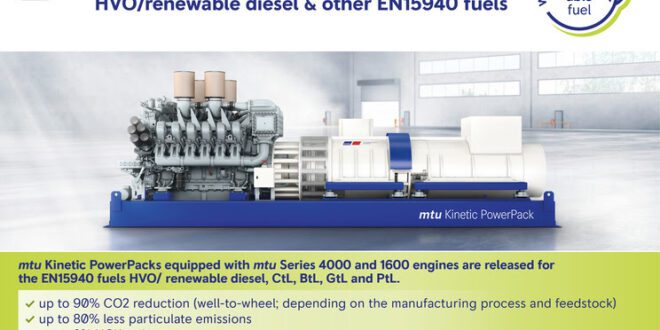- mtu Kinetic PowerPack for uninterruptible power supply now even more environmentally friendly
- Tests show: no loss of performance with HVO fuel
- System consists of mtu diesel engine coupled to kinetic energy accumulator via electromagnetic clutch and a synchronous machine
Rolls-Royce has approved its mtu Kinetic PowerPacks, based on the mtu Series 4000 and 1600 diesel engines, for use with the sustainable fuel HVO (Hydrogenated Vegetable Oil) and the other synthetic diesel fuels of the EN15940 standard. This means that the mtu systems for dynamic uninterruptible power supply (DUPS) can now be operated in an even more environmentally friendly manner. This is because with HVO the CO2 footprint can be reduced by up to 90 percent (depending on the fuel’s manufacturing process and feedstock), particulate emissions by up to 80 percent and nitrogen oxide emissions by up to eight percent compared to fossil diesel.
mtu Kinetic PowerPacks show same performance with HVO as with fossil diesel
Tests on the Rolls-Royce Power Systems test bench at the Liège site in Belgium showed that the use of HVO had no effect on the dynamic behavior of the engine during critical phases under typical load conditions. The systems performed the same with HVO as with fossil diesel. Previously, Rolls-Royce had already approved its mtu Series 1600 and Series 4000 gensets for EN15940 synthetic diesel fuels following successful tests on the test bench and in the field.
HVO reduces carbon footprint for data centers, hospitals, industry
“Operators of safety-critical facilities such as data centers, airports, hospitals, production plants for pharmaceuticals, petrochemicals, semiconductors and electronics have relied on our systems for many years. Now they can significantly reduce their carbon footprint and local emissions by using sustainable fuels,” explains Vittorio Pierangeli, Vice President Global Powergen at Rolls-Royce Power Systems.
Existing system and infrastructure requires no adaption
For HVO, waste vegetable and animal fats and used vegetable oils can be used as base materials, which are converted into hydrocarbons by means of a catalytic reaction with the addition of hydrogen. Through this process, the fats and vegetable oils are adapted in their properties to diesel fuel and can supplement or completely replace it as an admixture. Because HVO fuel is produced from renewable resources, its production, transportation, and combustion generate only about as many greenhouse gases as were absorbed by the plants during biomass growth. HVO is a drop-in fuel, which means that the existing infrastructure of the mtu Kinetic PowerPack requires no adaption for its use; no engine hardware or software modifications are required.
How a mtu Kinetic PowerPack works
The mtu Kinetic PowerPack comprises a constantly rotating kinetic energy storage unit with flywheel, an mtu diesel engine, and a generator that doubles as an electric motor for the purpose of compensation, depending on the operating mode. Power from the public grid drives the synchronous generator, which acts as an electric motor in this operating mode. This in turn drives the flywheel in the kinetic energy storage unit which weighs tons and is laid out as an electric machine with double rotor system which makes energy available in the event of a power outage.
What happens when the primary power source fails?
If the public power grid fails, the systems intervene immediately and without interruption because they are already in action anyway. Part of the energy stored in the flywheel is used to drive the generator, that begins producing electrical power. Meanwhile, another part of the stored rotational energy is used to facilitate very fast start-up of the diesel engine. Within the shortest possible time the engine reaches its rated power output and can now start producing electrical power via the generator and stabilize the flywheel. This happens without any interruption.
 Alternative Energy HQ solar power for homes, wind energy, and bio fuel issues
Alternative Energy HQ solar power for homes, wind energy, and bio fuel issues







